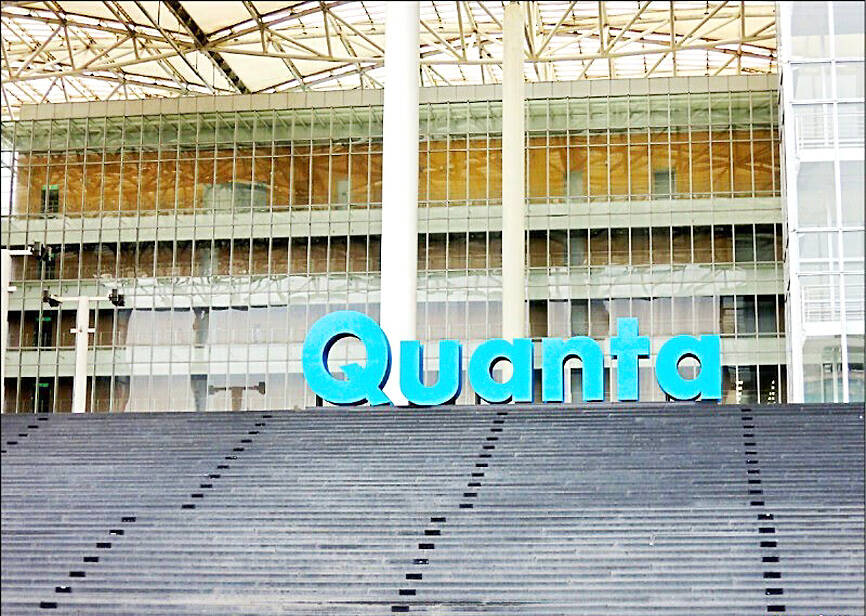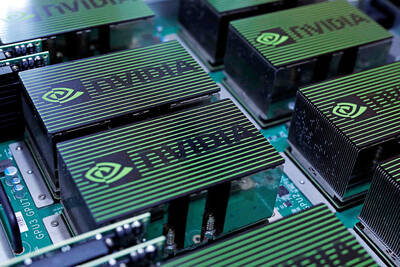Quanta Computer Inc’s (廣達電腦) board of directors has approved a plan to invest US$50 million in a new Vietnamese subsidiary, the company said yesterday, as the computer and server maker continues to diversify its production bases to meet customer demand for improved supply chain resiliency.
Quanta, a major assembler of Apple Inc’s MacBook computers, plans to produce notebook computers and some consumer electronics at the new Vietnamese facility, its second manufacturing hub in Southeast Asia after Thailand, it said.
“The company has been evaluating production diversification outside China since 2018 due to US-China trade disputes,” a Quanta official said in a telephone interview yesterday. “Customers are growing keen on our production allocation due to the effects of COVID-19 and geopolitical tensions.”

Photo: Vanessa Cho, Taipei Times
Vietnam has an abundant, affordable labor supply and benefits from an industrial cluster effect, the official said.
“However, China remains the company’s biggest notebook computer manufacturing site. Quanta assembles notebook computers primarily at its Shanghai and Chongqing factories currently,” they said.
Quanta’s move follows other Taiwanese electronics makers, including Compal Electronics Inc (仁寶), Wistron Corp (緯創), Pegatron Corp (和碩) and Inventec Corp (英業達), in increasing investment in Vietnam in the past few years.
Quanta has allocated manufacturing of low-cost consumer electronics and some servers to its Thailand factory, to avoid paying import tariffs implemented by the US and Europe due to a US-China trade row.
Taiwan has become the company’s major production site for servers, it said.
Quanta last week reported that first-quarter revenue contracted 18.39 percent quarter-on-quarter, down 11.8 percent year-on-year, to NT$266.18 billion (US$8.73 billion).
The company expects notebook computer shipments to return to growth this quarter, after slumping 36 percent annually to 10.8 million units last quarter.
Quanta’s net profit last year fell 14 percent to NT$28.96 billion, from NT$33.65 billion in 2021, with earnings per share dropping from NT$8.73 to NT$7.51.
Gross margin fell to 5.54 percent from 6.38 percent a year earlier.
The company plans to distribute a cash dividend of NT$6 per share to shareholders this year, representing a payout ratio of about 80 percent.

Leading Taiwanese bicycle brands Giant Manufacturing Co (巨大機械) and Merida Industry Co (美利達工業) on Sunday said that they have adopted measures to mitigate the impact of the tariff policies of US President Donald Trump’s administration. The US announced at the beginning of this month that it would impose a 20 percent tariff on imported goods made in Taiwan, effective on Thursday last week. The tariff would be added to other pre-existing most-favored-nation duties and industry-specific trade remedy levy, which would bring the overall tariff on Taiwan-made bicycles to between 25.5 percent and 31 percent. However, Giant did not seem too perturbed by the

AI SERVER DEMAND: ‘Overall industry demand continues to outpace supply and we are expanding capacity to meet it,’ the company’s chief executive officer said Hon Hai Precision Industry Co (鴻海精密) yesterday reported that net profit last quarter rose 27 percent from the same quarter last year on the back of demand for cloud services and high-performance computing products. Net profit surged to NT$44.36 billion (US$1.48 billion) from NT$35.04 billion a year earlier. On a quarterly basis, net profit grew 5 percent from NT$42.1 billion. Earnings per share expanded to NT$3.19 from NT$2.53 a year earlier and NT$3.03 in the first quarter. However, a sharp appreciation of the New Taiwan dollar since early May has weighed on the company’s performance, Hon Hai chief financial officer David Huang (黃德才)

NVIDIA FACTOR: Shipments of AI servers powered by GB300 chips would undergo pilot runs this quarter, with small shipments possibly starting next quarter, it said Quanta Computer Inc (廣達), which supplies artificial intelligence (AI) servers powered by Nvidia Corp chips, yesterday said that AI servers are on track to account for 70 percent of its total server revenue this year, thanks to improved yield rates and a better learning curve for Nvidia’s GB300 chip-based servers. AI servers accounted for more than 60 percent of its total server revenue in the first half of this year, Quanta chief financial officer Elton Yang (楊俊烈) told an online conference. The company’s latest production learning curve of the AI servers powered by Nvidia’s GB200 chips has improved after overcoming key component

UNPRECEDENTED DEAL: The arrangement which also includes AMD risks invalidating the national security rationale for US export controls, an expert said Nvidia Corp and Advanced Micro Devices Inc (AMD) have agreed to pay 15 percent of their revenue from Chinese artificial intelligence (AI) chip sales to the US government in a deal to secure export licenses, an unusual arrangement that might unnerve both US companies and Beijing. Nvidia plans to share 15 percent of the revenue from sales of its H20 AI accelerator in China, a person familiar with the matter said. AMD is to deliver the same share from MI308 revenue, the person added, asking for anonymity to discuss internal deliberations. The arrangement reflects US President Donald Trump’s consistent effort to engineer